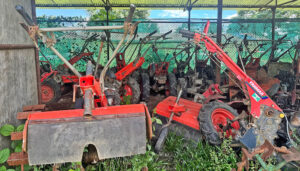Bhutan Government power tillers languish in sad state of repair

By Lhakpa Quendren
Gelephu—Most gewog power tillers distributed by the government, now managed by the Farm Machinery Corporation Limited (FMCL), are out of service, with some in need of restoration and others remaining idle and rusting.
Since 2019, the gewogs have voluntarily handed over these power tillers to FMCL for their farm machinery hiring service. Today, however, these machines have been neglected, with no clear plans for their operation.
In Sarpang, the FMCL’s regional office in Samtenling has 66 power tillers, 39 of which were surrendered from 12 gewogs. Currently, 13 are dysfunctional, 32 are repairable, and 21 functional machines remain idle.
Speaking to Kuensel, Agriculture and Livestock Minister Younten Phuntsho explained that many power tillers have exceeded their technical lifespan, rendering them inactive.
Some of these machines date back to 2010. Japanese power tillers, such as those from brands like Yamaha and Kubota, have a lifespan of 10 to 20 years with proper maintenance.
Lyonpo said that these power tillers were also not used because most farmers now own their own machines. “This is a positive sign of farm development. We should take pride in this achievement,” Lyonpo said. Some gewogs were reluctant to surrender their machines despite a 2017 executive order that required the machines to be returned to FMCL. The government eventually opted for voluntary returns in 2019.
Lyonpo said that going forward, FMCL will procure large machines, such as combine harvesters and tractors, which farmers are unable to afford. The government will also support purchase of power tillers by offering loans at reduced interest rates.
Residents attribute the poor condition of the machines to a lack of ownership and accountability. Many operators did not maintain the machine, and there were instances where parts were swapped with old machine components.
While the number of non-functional power tillers across the country remains unknown, FMCL currently manages 330 functional power tillers.
Since 2015, the government has distributed 753 power tillers across 205 gewogs.
In Tsirang, most power tillers remain at gewog centers due to FMCL’s lack of proper storage facilities. Of the 27 heavy and medium power tillers and 10 mini tillers, only five are operational.
FMCL In-charge in Tsirang said that nearly every household now owns a power tiller, which has reduced demand for government machines. “Farmers prefer mini tillers, which are easier to use and transport,” he said, adding that mini power tillers are occasionally rented out to neighbouring villages in other dzongkhags.
Local leaders said that due to their size, the machines were unsuitable for sloped or paddy terrain. And frequent breakdowns requiring costly repairs dissuaded farmers from hiring these power tillers.
Tsholingkhar Gup Passang Thingh Tamang said that machines had to be sent to Gelephu for repairs, which took up to a month, making them unavailable during paddy season. “We also required trained and certified operators, who are not always available when needed.”
Another local leader said that no proper research was conducted to assess location-based needs before the distribution. “Farmers prefer portable power tillers while most government-distributed ones are heavy and medium-sized. Farmers do not want to use larger machines,” he said.
Tsholingkhar Mangmi Bijay Monger said that the power tillers were used only a few times initially and otherwise remained idle inside a shed. The engines have been returned to FMCL, but the unused tillers are now rusting and have punctured tires.
On the other hand, Gelephu Mangmi Sonam Dakpa said that power tillers were useful when available at the gewog, especially as using oxen has become less popular. “We rely on power tillers because hiring a tractor is expensive,” he said.
Some residents have suggested auctioning the functional machines and scrapping the damaged ones to prevent further deterioration. However, officials have indicated that this is not possible as these machines were provided under a grant programme.
Officials also highlighted the high cost of repairing and maintaining these machines, with minimal or no return.
Despite revising hiring rates – Nu 2,230 per day for heavy and medium tillers and Nu 1,810 for mini tillers – to make them more affordable, underlying issues remain.
The FMCL’s machinery hiring service has tilled over 100,000 acres of land between 2017 and 2023, benefiting 63,436 households across the country.




